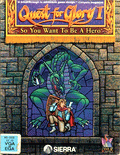
































Quest for Glory I: So You Want To Be A Hero

Hero's Quest: So You Want to Be a Hero (later re-released as Quest for Glory: So You Want to Be a Hero because of trademark issues involving the HeroQuest boardgame) is an adventure game/role-playing game hybrid, designed by Lori Ann Cole and published by Sierra On-line. It is the first game in the Quest for Glory series. Hero's Quest I has been credited for being a genre-defining game, as it tried to mix graphical adventure gaming with role-playing-like elements such as statistic building (strength, intelligence, health) that would actually have an impact on the ability to accomplish certain parts of the game. (Beyond Zork had done the same for text adventures two years earlier.)
In the valley barony of Spielburg, the evil ogress Baba Yaga has cursed the land and the baron who tried to drive her off. His children have disappeared, while the land is ravaged by monsters and brigands. The Valley of Spielburg is in need of a Hero able to solve these problems.
The game follows the Hero, who is a customized adventurer whose name and class is chosen by player, on his journey into the land; he must help people and become a proclaimed Hero. In the novelized Authorized strategy guide, he is named Devon Aidendale by the author.
The adventurer battles monsters, solves side quests (such as finding lost items and spell ingredients) and helps fantasy creatures such as a dryad, a hermit and a colourful collection of furry creatures called Meeps. Fulfilling quests will grant him experience and money, which he may use to buy equipment and potions. The game is open ended, which means the player can explore all the game at once and solve the quests in what order seems convenient to them. During the quest, the character also meets recurring series characters such as the wizard Erasmus and his familiar Fenrus (or perhaps the other way around), and first hears tales of the benevolent faery Erana.
While the game can be completed without solving the secondary quests, in the optimal ending, which nets the player the maximum score and serves as canon for the remainder of the series, the player frees the baronet from a powerful curse and thwarts the plans of the witch Baba Yaga. Finally, the adventurer frees the baron's daughter, Elsa von Spielburg, from the curse which had transformed her into the brigand leader. By doing so, the adventurer fulfills a prophecy, restores Spielburg Valley to prosperity, and is awarded the title of Hero.
After this, the Hero, along with the merchant Abdulla Doo and the innkeepers Shameen and Shema, leaves on a magic carpet for Shapeir, the homeland of the three, setting the plan for the sequel, Quest for Glory II: Trial by Fire. The game advertised itself as 'three games in one' since it was the first Sierra game that (according to RPG customs) allowed the selection of a character out of three classes: Fighter, Magic User, and Thief.
What class the hero assigns to a character largely determines how they can solve puzzles and what quests they will run into. However, the distinction between classes was not an absolute one; players could add skills to a character and allow them to complete quests related to other classes in this game and others in the series.
Quest for Glory introduced a realism rarely found in RPGs and other adventure games even today. Day, night and the passage of time was a factor; the setting and scenery was different during day and night. The main character had to eat on a regular basis, he would become tired from running and fighting which required rest and sleep. Skills were not obtained by gaining levels through combat, but rather increased distinctly through the regular course of your adventuring. The more the player used magic, the more the Hero's Magic ability would increase (followed by Intelligence); likewise the more the player engaged in battle, training, or even cleaning the baron's stables, the more the Hero's Strength, Vitality and Agility would increase.
This is one of the few Sierra adventure games where the player character has few or no speaking lines; although the player can input commands such as 'ask about brigands', the player character has almost no dialogue.
How to play:
Click on the joystick icon in the Quest for Glory I: So You Want To Be A Hero online emulator to see how to control the Quest for Glory I: So You Want To Be A Hero game









































Comments